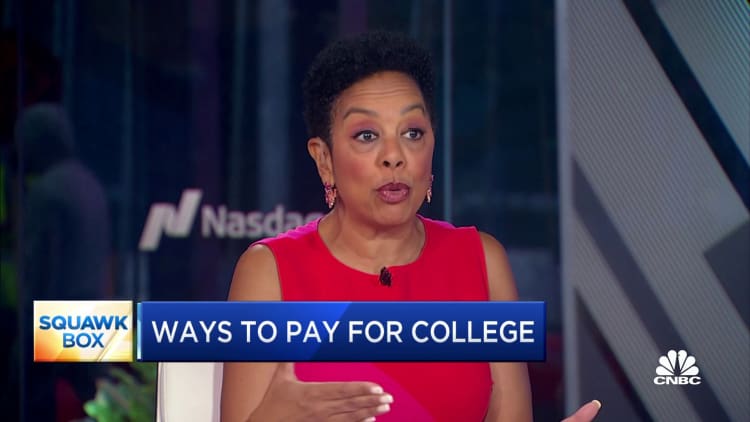
Getting into college is hard enough, but figuring out how to pay for it is even trickier.
Problems with the new Free Application for Federal Student Aid only add to the stress this year.
"All of these different pieces create a concern about placement and affordability," said Eric Greenberg, president of Greenberg Educational Group, a New York-based consulting firm. "People are anxious."
More from Personal Finance:
FAFSA ‘loophole’ lets grandparents help pay for college
Biden to forgive $1.2 billion in student debt for more borrowers
This could be the best year to lobby for more college financial aid
Higher education already costs more than most families can afford, and college costs are still rising. Tuition and fees plus room and board for a four-year private college averaged $56,190 in the 2023-2024 school year. Meanwhile, a four-year, in-state public college averaged $24,030, according to the College Board.
For most students and their families, the amount of financial aid offered and the breakdown between grants, scholarships, work-study opportunities and student loans are key to covering those costs.
And yet, fewer students have applied for financial assistance at all. However, it’s not too late for families worried about paying for college next year to submit the FAFSA or reach out to the college financial aid office for more money. These three strategies can help.
1. Apply for financial aid
In ordinary years, high school graduates miss out on billions in federal grants because they don't apply for financial aid.
However, problems with the new FAFSA have resulted in even fewer students applying overall. As of the last tally, nearly 4 million students have submitted the 2024-25 FAFSA form so far.
That's a fraction of the 17 million students who used the FAFSA form in previous years, according to the U.S. Department of Education.
As of February, only 22% of the high school class of 2024 had completed the FAFSA, according to the National College Attainment Network, down roughly 45% from a year ago.
Submitting a FAFSA is also one of the best predictors of whether a high school senior will go on to college, the National College Attainment Network found. Seniors who complete the FAFSA are 84% more likely to immediately enroll in college.
"If you're a student and haven't completed the FAFSA there is still time to do so and you absolutely should," said Rick Castellano, a spokesperson for education lender Sallie Mae.
"Ultimately, you want to make the most informed decision as possible when it comes to paying for college so completing the FAFSA should still be a priority — it's critically important when it comes to qualifying for need-based aid like grants, state-based aid, and scholarships," he said.
2. Ask for more school aid
For families who have already filed the FAFSA but are still concerned about making ends meet, it is also possible to amend their FAFSA form or reach out to the college financial aid office for help, Greenberg said.
Because this year's award letters are likely to look a lot different, that also opens the door for families to ask for more college aid.
For example, as part of the FAFSA simplification, families will no longer get a break for having multiple children in college at the same time, effectively eliminating the "sibling discount."
In that case, you may be able to appeal to the college financial aid office, according to Menaka Hampole, assistant professor of finance at the Yale School of Management. "The question is whether people know that they can."

If there are needs-based issues beyond what was noted in the financial aid paperwork, such as another sibling in college or changes in your financial circumstances, like a job loss, that should be explained to the school and documented, if possible.
Alternatively, if the financial aid packages from other, comparable schools were better, that is also worth bringing to the school's attention in an appeal.
"It's very important for students and families to know that financial aid offices tend to be very approachable," Greenberg said.
3. Pursue private scholarships
It also makes sense to consider other sources for merit-based aid, Castellano advised. "Of course, continue to apply for scholarships," he said.
In fact, there are more than 1.7 million private scholarships and fellowships available, often funded by foundations, corporations and other independent organizations, with a total value of more than $7.4 billion, according to higher education expert Mark Kantrowitz.
"Many don't require a completed FAFSA," Castellano said, and there are free resources that can match you to available scholarships based on your skills and interests.
Check with the college, or ask your high school counselor about opportunities. You can also search websites like Scholarships.com and the College Board.
Don't miss these stories from CNBC PRO:
- Warren Buffett's Berkshire keeps new stock pick secret — again. Here's what it means
- Michael Burry of 'The Big Short' fame buys Amazon, Alphabet and a dozen other new stocks
- Move over, Nvidia. There's a new hot AI play that has soared 960% in the past year
- Morgan Stanley's Slimmon names 3 stocks to buy right now: 'It's going to be a good year for equities'
- This little-known bank is offering one of the highest CD rates


